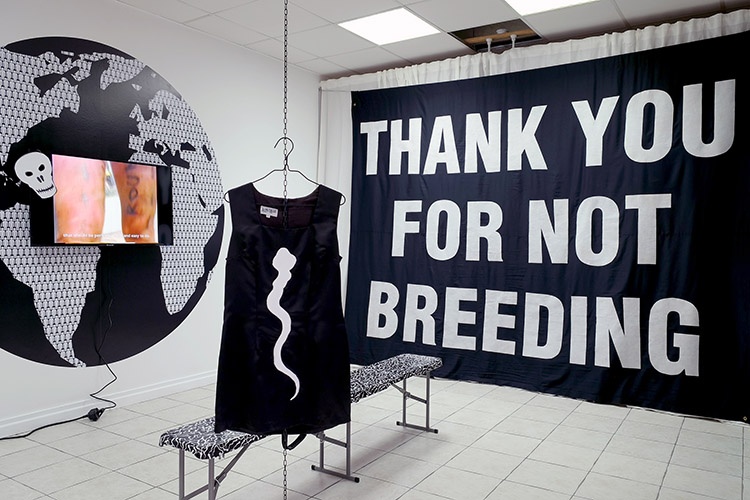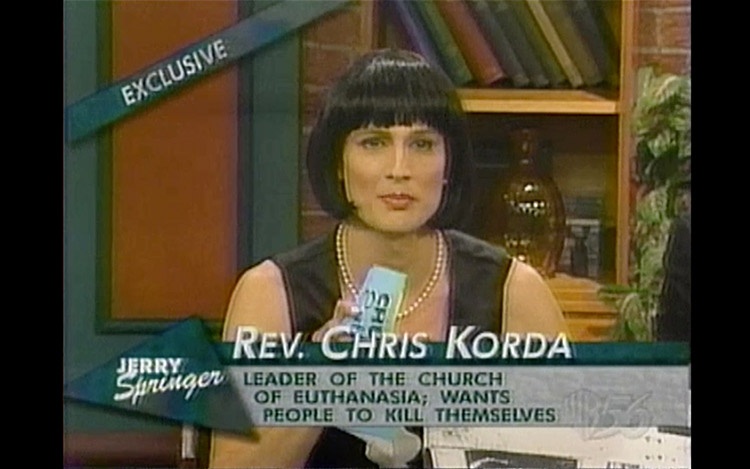ON CHRIS KORDA’S LP “APOLOGIZE TO THE FUTURE”

“Chris Korda, The Church of Euthanasia Archives,” Goswell Road, Paris, 2019, installation view
I’ve been a fan of Chris Korda’s music and Dadaist performance work since the early 2000s. So, I used my 5 minute video and Korda’s latest song, “A Thin Layer of Oily Rock,” from her LP Apologize to the Future, to speed through a 20-year chronology of my views and influences regarding the huge subjects of procreation, ecofeminism, pedagogy, and performative activism.
Korda is a techno musician, an environmental and antinatalist activist, has identified as transgender since 1991, and has been the Reverend of the Church of Euthanasia since 1992. The Church of Euthanasia is (or was? I don’t know how active the Church is now) “a non-profit educational foundation devoted to restoring balance between Humans and the remaining species on Earth,” and its founding ideology is “Thou Shalt not Procreate.” The Church has produced a vast array of political activism material: sermons, street propaganda, protests, tracts, participation in TV shows (like The Jerry Springer Show, for instance) and a website that, very early on (for the internet, that is), was used as an educational and proselytizing media platform, with a quarterly PDF journal, videos, music, interviews, etc.
At about the same time I got to know the Church, I read Donna Haraway’s “Cyborg Manifesto.” In its style, I found strategies similar to that of Korda’s: emphasis, exaggeration, exacerbation, theatricality; all were put in use in order to de-essentialize, or de-purify, or complicate gender and political activism. In its rhetoric, I also found parallels with Korda’s blurring of borders between species. I also read Lee Edelman’s book No Future: Queer Theory and the Death Drive, with its critique of “reproductive futurism,” its embrace of negativity, and its refusal to see the child as the bearer of innocence and rejuvenation. In 2013, with Petunia, the feminist publication I founded with Dorothée Dupuis and Valérie Chartrain, we curated “Pro-choice,” an exhibition dedicated to Frankenstein and Mary Shelley, and a critique of the particular type of procreation imperative that weighs on women in neoliberal societies. All the while, Chris Korda had disappeared: from 2003 or 2004, she stopped making music, at least publicly. I remember a 2017 conversation with Claire Van Lubeek, a former student of mine, on the set of Beyond the Land of Minimal Possessions, the film we were shooting in Marfa, Texas. Given the subject of this comedy – the deterioration of land and the distortion of life by art and gentrification – we wanted to have Korda come and sing “Save the Planet, Kill Yourself.” But we decided against disturbing someone who had decided to move away from art production.

Chris Korda & The Church of Euthanasia, “I Want to Join A Suicide Cult,” 1997, video still
Korda returned the year after, in 2018, which is also the year I read Petrolio, Pier Paolo Pasolini’s complex, queer, and ecological “fable,” published 19 years after his murder. At the beginning of Petrolio, Carlo, the main character, is divided into two male protagonists: both of them will transform into a woman and back into a man over the course of Carlo’s voyage through capitalism, oil exploitation, corruption, degradation, and violence. Pasolini considered capitalism to be an advanced form of fascism: a cultural, emotional, and ecological genocide. He developed this parallel in his famous text Disappearance of the Fireflies, using provocative, performative strategies of exacerbation also typical of Korda’s work.
I continue to explore Petrolio with my students: together we are making a long film, divided into many episodes, about groups of young people reading Pasolini’s book and sabotaging the emblems of ecocide capitalism that, together with a mountainous and imposing natural landscape, surround Grenoble, the high-tech and industrial “smart city” in which I live. The film describes forms of contagion between those groups, who repeat the same actions of sabotage – sometimes done more for theatricality than for actual destruction – one after the other, over and over again. The film will be signed collectively under the name Gruppo Petrolio. We would like to ask for Chris Korda’s permission to use her song “A Thin Layer of Oily Rock” as the soundtrack of the film: “Just a thin layer / Of oily rock / Is all we’ll be / If we sleepwalk / So wise up fast / It’s not too late / Respect the future / Don’t procreate.”
